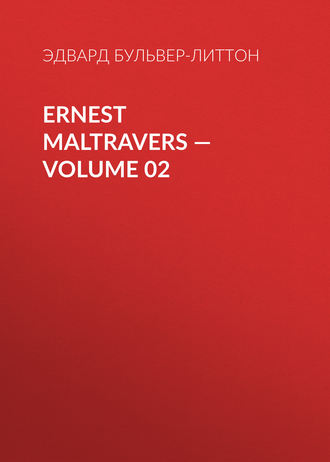
Эдвард Бульвер-Литтон
Ernest Maltravers — Volume 02
"And so you think these stately Romans were not, after all, so dissimilar to ourselves?" said Valerie, one day, as they looked over the same earth and ocean along which had roved the eyes of the voluptuous but august Lucullus.
"In the last days of their Republic, a /coup-d'oeil of their social date might convey to us a general notion of our own. Their system, like ours—a vast aristocracy heaved and agitated, but kept ambitious and intellectual, by the great democratic ocean which roared below and around it. An immense distinction between rich and poor—a nobility sumptuous, wealthy, cultivated, yet scarcely elegant or refined; a people with mighty aspirations for more perfect liberty, but always liable, in a crisis, to be influenced and subdued by a deep-rooted veneration for the very aristocracy against which they struggled;—a ready opening through all the walls of custom and privilege, for every description of talent and ambition; but so strong and universal a respect for wealth, that the finest spirit grew avaricious, griping, and corrupt, almost unconsciously; and the man who rose from the people did not scruple to enrich himself out of the abuses he affected to lament; and the man who would have died for his country could not help thrusting his hands into her pockets. Cassius, the stubborn and thoughtful patriot, with his heart of iron, had, you remember, an itching palm. Yet, what a blow to all the hopes and dreams of a world was the overthrow of the free party after the death of Caesar! What generations of freemen fell at Philippi! In England, perhaps, we may have ultimately the same struggle; in France, too (perhaps a larger stage, with far more inflammable actors), we already perceive the same war of elements which shook Rome to her centre, which finally replaced the generous Julius with the hypocritical Augustus, which destroyed the colossal patricians to make way for the glittering dwarfs of a court, and cheated the people out of the substance with the shadow of liberty. How it may end in the modern world, who shall say? But while a nation has already a fair degree of constitutional freedom, I believe no struggle so perilous and awful as that between the aristocratic and the democratic principle. A people against a despot—/that/ contest requires no prophet; but the change from an aristocratic to a democratic commonwealth is indeed the wide, unbounded prospect upon which rest shadows, clouds, and darkness. If it fail—for centuries is the dial-hand of Time put back; if it succeed—"
Maltravers paused.
"And if it succeed?" said Valerie.
"Why, then, man will have colonised Utopia!" replied Maltravers.
"But at least, in modern Europe," he continued, "there will be fair room for the experiment. For we have not that curse of slavery which, more than all else, vitiated every system of the ancients, and kept the rich and the poor alternately at war; and we have a press, which is not only the safety-valve of the passions of every party, but the great note-book of the experiments of every hour—the homely, the invaluable ledger of losses and of gains. No; the people who keep that tablet well, never can be bankrupt. And the society of those old Romans; their daily passions—occupations—humours!—why, the satire of Horace is the glass of our own follies! We may fancy his easy pages written in the Chaussee d'Antin, or Mayfair; but there was one thing that will ever keep the ancient world dissimilar from the modern."
"And what is that?"
"The ancients knew not that delicacy in the affections which characterises the descendants of the Goths," said Maltravers, and his voice slightly trembled; "they gave up to the monopoly of the senses what ought to have had an equal share in the reason and the imagination. Their love was a beautiful and wanton butterfly; but not the butterfly which is the emblem of the soul."
Valerie sighed. She looked timidly into the face of the young philosopher, but his eyes were averted.
"Perhaps," she said, after a short pause, "we pass our lives more happily without love than with it. And in our modern social system" (she continued, thoughtfully, and with profound truth, though it is scarcely the conclusion to which a woman often arrives) "I think we have pampered Love to too great a preponderance over the other excitements of life. As children, we are taught to dream of it; in youth, our books, our conversation, our plays, are filled with it. We are trained to consider it the essential of life; and yet, the moment we come to actual experience, the moment we indulge this inculcated and stimulated craving, nine times out of ten we find ourselves wretched and undone. Ah, believe me, Mr. Maltravers, this is not a world in which we should preach up too far the philosophy of Love!"
"And does Madame de Ventadour speak from experience?" asked Maltravers, gazing earnestly upon the changing countenance of his companion.
"No; and I trust that I never may!" said Valerie, with great energy.
Ernest's lip curled slightly, for his pride was touched.
"I could give up many dreams of the future," said he, "to hear Madame de Ventadour revoke that sentiment."
"We have outridden our companions, Mr. Maltravers," said Valerie, coldly, and she reined in her horse. "Ah, Mr. Ferrers," she continued, as Lumley and the handsome German baron now joined her, "you are too gallant; I see you imply a delicate compliment to my horsemanship, when you wish me to believe you cannot keep up with me: Mr. Maltravers is not so polite."
"Nay," returned Ferrers, who rarely threw away a compliment without a satisfactory return, "Nay, you and Maltravers appeared lost among the old Romans; and our friend the baron took that opportunity to tell me of all the ladies who adored him."
"Ah, Monsieur Ferrare, /que vous etes malin/!" said Schomberg, looking very much confused.
"/Malin/! no; I spoke from no envy: /I/ never was adored, thank Heaven!
What a bore it must be!"
"I congratulate you on the sympathy between yourself and Ferrers," whispered Maltravers to Valerie.
Valerie laughed; but during the rest of the excursion she remained thoughtful and absent, and for some days their rides were discontinued. Madame de Ventadour was not well.
CHAPTER III
"O Love, forsake me not;
Mine were a lone dark lot
Bereft of thee."
HEMANS, /Genius singing to Love/.
I FEAR that as yet Ernest Maltravers had gained little from Experience, except a few current coins of worldly wisdom (and not very valuable those!) while he has lost much of that nobler wealth with which youthful enthusiasm sets out on the journey of life. Experience is an open giver, but a stealthy thief. There is, however, this to be said in her favour, that we retain her gifts; and if ever we demand restitution in earnest, 'tis ten to one but what we recover her thefts. Maltravers had lived in lands where public opinion is neither strong in its influence, nor rigid in its canons; and that does not make a man better. Moreover, thrown headlong amidst the temptations that make the first ordeal of youth, with ardent passions and intellectual superiority, he had been led by the one into many errors, from the consequences of which the other had delivered him; the necessity of roughing it through the world—of resisting fraud to-day, and violence to-morrow,—had hardened over the surface of his heart, though at bottom the springs were still fresh and living. He had lost much of his chivalrous veneration for women, for he had seen them less often deceived than deceiving. Again, too, the last few years had been spent without any high aims or fixed pursuits. Maltravers had been living on the capital of his faculties and affections in a wasteful, speculating spirit. It is a bad thing for a clever and ardent man not to have from the onset some paramount object of life.
All this considered, we can scarcely wonder that Maltravers should have fallen into an involuntary system of pursuing his own amusements and pursuits, without much forethought of the harm or the good they were to do to others or himself. The moment we lose forethought, we lose sight of duty; and though it seems like a paradox, we can seldom be careless without being selfish.
In seeking the society of Madame de Ventadour, Maltravers obeyed but the mechanical impulse that leads the idler towards the companionship which most pleases his leisure. He was interested and excited; and Valerie's manners, which to-day flattered, and to-morrow piqued him, enlisted his vanity and pride on the side of his fancy. But although Monsieur de Ventadour, a frivolous and profligate Frenchman, seemed utterly indifferent as to what his wife chose to do—and in the society in which Valerie lived, almost every lady had her cavalier,—yet Maltravers would have started with incredulity or dismay had any one accused him of a systematic design on her affections. But he was living with the world, and the world affected him as it almost always does every one else. Still he had, at times, in his heart, the feeling that he was not fulfilling his proper destiny and duties; and when he stole from the brilliant resorts of an unworthy and heartless pleasure, he was ever and anon haunted by his old familiar aspirations for the Beautiful, the Virtuous, and the Great. However, hell is paved with good intentions; and so, in the meanwhile, Ernest Maltravers surrendered himself to the delicious presence of Valerie de Ventadour.
One evening, Maltravers, Ferrers, the French minister, a pretty Italian, and the Princess di ———, made the whole party collected at Madame de Ventadour's. The conversation fell upon one of the tales of scandal relative to English persons, so common on the Continent.
"Is it true, Monsieur," said the French minister, gravely, to Lumley, "that your countrymen are much more immoral than other people? It is very strange, but in every town I enter, there is always some story in which /les Anglais/ are the heroes. I hear nothing of French scandal—nothing of Italian—/toujours les Anglais/."
"Because we are shocked at these things, and make a noise about them, while you take them quietly. Vice is our episode—your epic."
"I suppose it is so," said the Frenchman, with affected seriousness. "If we cheat at play, or flirt with a fair lady, we do it with decorum, and our neighbours think it no business of theirs. But you treat every frailty you find in your countrymen as a public concern, to be discussed and talked over, and exclaimed against, and told to all the world."
"I like the system of scandal," said Madame de Ventadour, abruptly; "say what you will, the policy of fear keeps many of us virtuous. Sin might not be odious, if we did not tremble at the consequence even of appearances."







